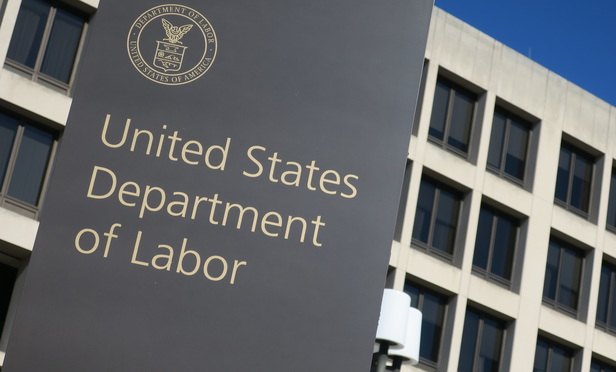 Labor Department headquarters in Washington. (Photo: Mike Scarcella/ALM)
Labor Department headquarters in Washington. (Photo: Mike Scarcella/ALM)
During the first day-long public hearing on its fiduciary prohibited transaction exemption to align with the Securities and Exchange Commission's Regulation Best Interest, the Labor Department heard from panels of officials, some of whom called for further changes to it, as well as for Labor to defer final rulemaking until Reg BI effectiveness can be determined.
As of Thursday afternoon, there was no word from Labor on whether a second hearing would be held Friday.
Recommended For You
Sam Edwards, president of the Public Investors Advocate Bar Association, a group of lawyers that represent wronged investors in disputes against the securities industry, pointed to two chief concerns with Labor's plan.
First, Labor should reconsider its reinstatement of the 1975 regulation applying a five-part test to determine whether an advisor is a fiduciary. "The regulation, if implemented, will result in ERISA's fiduciary obligations applying to very few of the advisors who investors rely upon," Edwards told Labor.
Second, "PIABA believes the new regulation, to the extent it would apply to any advisor or brokerage firm, weakens the fiduciary standard, especially as it relates to the proposed prohibited transaction exemption. If these rules are implemented, they will negatively impact workers and retirees and, essentially repeal ERISA's fiduciary duty."
Borzi's remarks
Phyllis Borzi, former head of Labor's Employee Benefits Security Administration, said after the hearing on a separate call held by the Institute for the Fiduciary Standard that with its planned PTE, Labor has taken the "unprecedented" step of "simply deferring to another federal agency" with a different mandate and statute, and therefore is "abdicating" its responsibility to plan participants.
Further, she argued, "Reg BI has only been in effect for two months," and the fact that it has not been tested in practice is "troubling."
"This [hearing] procedure was way too rushed and unfair," Borzi added. "It's perfectly clear to me they intend to move forward as quickly as possible" with their plan.
Campbell comments
Brad Campbell, another former EBSA head who's now a partner at Faegre Drinker in Washington, argued the PTE should be "significantly modified" to provide strong protections for consumers while providing access to insurance and annuities.
The proposed class exemption, Campbell said, is written "to align with securities regulation, but insurance regulation is materially different."
The department, he explained, "needs to provide additional alternative conditions for insurance transactions and use the NAIC model rule on annuity transactions as a guide, just as the department has used Regulation Best Interest as a guide" in the proposal.
Also, the guidance on the five-part test is "fundamentally flawed," Campbell said. While at first it acknowledges that the sale of insurance products "is not fiduciary advice," the guidance "goes on to create some significant ambiguity in the application of the five part test, making it impossible to know with clarity where the department thinks the line has been drawn."
Roper's views
Barbara Roper, director of investor protection for the Consumer Federation of America, argued in her testimony that Labor "was wrong … to reinstate the five-part test, which it has previously found enables firms to evade their fiduciary obligations in circumstances where they are clearly functioning as advice fiduciaries and are reasonably relied on as advice fiduciaries by retirement savers."
The number of comments Labor "has received on this point demonstrates just how unwise it was to reinstate the definition through a final rule, with no opportunity for input," Roper said.
Also, Labor "issued its proposal one day before the SEC's Reg BI was due to take effect, … there hasn't been time for us — or the Department — to comprehensively study whether, or to what extent, Reg. BI has caused firms to change the way they do business," she explained.
In particular, Roper added, "there hasn't been time to fully assess whether Reg BI has caused firms to abandon incentive practices that [Labor] previously determined, as part of the regulatory record for this proposal, are likely to induce financial professionals to base their recommendations on their own interests, rather than their customers' best interests."
She also stressed: We have even less information regarding the effect of the NAIC model rule."
NASAA input
In addition, Andrea Seidt, Ohio Commissioner of Securities and, chair of NASAA Regulation Best Interest Implementation Committee, urged Labor to defer "final rulemaking until it has a factual record validating the effectiveness of the SEC's approach" in Reg BI.
© 2025 ALM Global, LLC, All Rights Reserved. Request academic re-use from www.copyright.com. All other uses, submit a request to [email protected]. For more information visit Asset & Logo Licensing.







